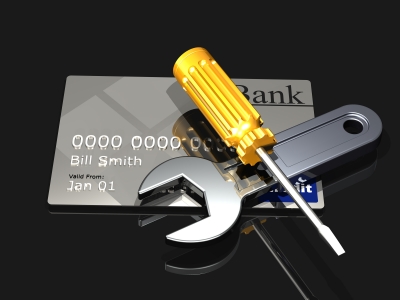Archive for the ‘Uncategorized’ Category
Monday, October 12th, 2009
 You’ve seen the ads… they tell you to “Call today and we’ll make your credit card debt go away!” It’s just another part of the overall government-entitlement climate of bail-outs, homebuyer credits, cash for clunkers, loan modifications and short-sales. The ads make it sound like you have a right to walk away from all your debts. You’ve seen the ads… they tell you to “Call today and we’ll make your credit card debt go away!” It’s just another part of the overall government-entitlement climate of bail-outs, homebuyer credits, cash for clunkers, loan modifications and short-sales. The ads make it sound like you have a right to walk away from all your debts.
The trouble is, unless you are seriously in default on your credit cards, it isn’t likely to happen. Those companies will take your money, but they probably won’t deliver.
Credit card debt settlement is offered by some lenders after your account is so far in default that their next step is to either sell it for pennies on the dollar to a collection agency or pay an attorney to sue you.
In other words, they aren’t going to do that unless it appears to be the most financially advantageous route for them. And even then, some credit card companies won’t do it.
So…you can simply stop paying and wait for them to make you a settlement offer. But be prepared for what will happen next.
As soon as your payment is a day late, the interest rate will soar. It could go as high as 29.9%. Next, your credit limit will be reduced to at or below your current balance. That means that when the late penalty and interest are added on, you’ll be over limit. There’s a fee for that, you know.
Next, your phone will begin to ring at all hours of the day. You’ll also get nasty letters.
As you might expect, those late payment notations on your credit report will send your credit scores tumbling. That can cause your insurance rates to rise, could prevent you from getting a promotion or a new job, and keep you from buying anything on credit for several years.
Finally, unless you do have the cash to reach a settlement, you could face legal action. If the card issuer brings suit against you there will probably be a judgment in their favor – at which time they can garnish your wages and attach your assets.
Only you know if it’s worth it.
If you do decide to seek a settlement, stay away from those companies advertising on TV and the Internet. Instead, seek out a competent attorney to advise you and negotiate on your behalf.
Author: Mike Clover
CreditScoreQuick.com your resource for free credit reports, credit cards, loans, and ground breaking credit news.
Posted in Uncategorized | 2 Comments »
Sunday, October 11th, 2009
 In a letter dated September 18, Assistant Secretary for Housing- Federal Housing Commissioner, David H. Stevens, outlined changes in the FHA Streamline Refinance Program to take effect November 17, 2009. In a letter dated September 18, Assistant Secretary for Housing- Federal Housing Commissioner, David H. Stevens, outlined changes in the FHA Streamline Refinance Program to take effect November 17, 2009.
This program, which is available only to homeowners with existing FHA home loans, was designed to help those homeowners reduce their mortgage payments, and thus stay in their homes.
Right now, the program only requires that the homeowners meet a minimum credit score and that the new loan does not exceed the original balance of the old loan. Homeowners are not required to show proof of income, employment, or assets, and no appraisal is required.
This is about to change.
For starters, the loan to be refinanced must be seasoned for at least 6 months, and the homeowner must be in good standing. Contrary to rumors that the only people who get help with mortgages are those in default, default will put you out of the running for a FHA Streamline Refinance.
For mortgages with less than a 12 months payment history, the borrower must have made all mortgage payments within the month due.
If the mortgage is one year old or older, the borrower must have made each payment within the month due for the previous 3 months, and must not have had more than one 30-day late payment in the past year.
Next, the borrower must now show proof of employment and income. If cash will be needed at closing, the lender must verify that those assets are available prior to submitting a loan for endorsement.
As might be expected, the new loan must be beneficial to the borrower. It must be a change in loan program, result in a 5% or more reduction in the mortgage payment, or result in a shorter loan term.
One significant change involves appraisals. If the borrower wishes to include closing costs and pre-paid escrow items, an appraisal will be required.
The loan will then be limited to either: the outstanding principal balance, plus closing costs, escrow amounts, and mortgage insurance, or 97.75% of the appraised value, plus such costs. Points may not be financed.
Since many homes are now appraising for less than their mortgage balances, this requirement could prevent use of the program for all homeowners without the cash to cover closing costs and pre-paid taxes and insurance.
The mortgage insurance premium can still be included in the mortgage, with or without the appraisal.
Author: Mike Clover
CreditScoreQuick.com your resource for free credit reports, credit cards, loans, and ground breaking credit news.
Posted in Uncategorized | 4 Comments »
Wednesday, October 7th, 2009
 Usury has been the subject of both debate and scorn for centuries. When Shakespeare wrote “The Merchant of Venice” in the 16th century, the character Shylock had to forsake usury in order to gain admittance to heaven. Usury has been the subject of both debate and scorn for centuries. When Shakespeare wrote “The Merchant of Venice” in the 16th century, the character Shylock had to forsake usury in order to gain admittance to heaven.
It is no wonder that most states enacted usury laws to protect their citizens. Now, however, the protection is largely gone.
Usury laws still exist in most states, although they can be confusing. While generally fixed, they can in some cases be tied to variable factors such as the U.S. Treasuries Security Rate. Then the allowable rate can vary according to the dollar figure and the type of contract.
The fixed portion can vary greatly. In Arkansas, for instance, the cap on interest rates for consumers is 17%, while in Idaho it’s 12% and in Alabama it’s 6%.
How then, can credit card companies charge as much as 29.9%?
Because usury laws don’t apply to banks, savings and loan institutions, or credit unions – thus they don’t apply to credit cards.
In 1978 the Supreme Court ruled that national banks could charge the highest interest rate allowed in that bank’s home state. Since states such as Delaware and South Dakota have nonexistent usury laws, all these banks needed to do was claim one of those states as “home.” It no longer mattered in which state the borrower resided.
Then, in 1980 the Depository Institutions Deregulation and Monetary Control act gave state-chartered banks the same rights. Under this law, all federally insured banks, including state chartered banks, may charge out of state consumers the highest rate permissible in the state, district, or territory that the bank calls home.
Then, in 1999, when President Clinton signed the Gramm-Leach-Biley Act into law, the final restrictions in Arkansas fell. This law allowed Arkansas banks to charge the greater of their own state’s usury limit, or the highest rate charged by an out-of-state bank with a branch in that state.
Other states, acting under the terms of the DIDMC act, soon followed. State legislatures across the country passed “wild-card parity statutes” that allowed their own state banks the same privilege.
Thus, while usury laws are on the books, they don’t mean much. Usury law limits simply don’t apply to banks any more.
If you’re looking for a cap on interest rates, look toward a credit union. The National Credit Union Administration currently sets the usury limit for federally chartered credit unions at 18% – without regard to the state in which the credit union is located.
State usury laws still do apply to commercial transactions by non-banking entities
Author: Mike Clover
CreditScoreQuick.com your resource for free credit reports, credit cards, loans, and ground breaking credit news.
Posted in Uncategorized | Comments Off
Wednesday, October 7th, 2009
 It just might. It just might.
HR 3706, introduced by Representative Scott Garrett, calls for major changes in Federal Housing Administration (FHA) loan programs.
While the “no money down” loans of just a few years ago are a distant memory, FHA loans offer borrowers the opportunity to purchase a home with just 3.5% down, and more relaxed credit guidelines than conventional loans.
Borrowers can purchase a house with a FICO score of 620, as long as they have a good credit history for the past 12 to 24 months, and 3 lines of credit in good standing for the previous year.
For that reason, about 30% of loans being written today are backed by FHA.
Under HR 3706, the down payment requirement could increase to 5%. In addition, the ability to roll closing costs into the mortgage loan will be removed. These costs, unless paid by the seller, will add another 2% to 3% to the funds needed to close.
On a $150,000 home, the current regulations would require the borrower to come to the table with $5,250. If passed, the new regulations could require that same borrower to come in with at least $7,500 and up to $12,000 if the seller refuses to pay closing costs.
While requiring a buyer to contribute more out of pocket does reduce the risk to the lender, this change will push many first time buyers out of the housing market until they save for the down payment. Given the state of the economy, that could take many months, if not years.
Had these kinds of regulations been in place a few years ago, we probably would not be facing the current mortgage crisis. Banks would not have failed due to foreclosures, and record numbers of consumers would not be facing the loss of their homes. Thus, the changes will be beneficial in the long run, but in the short term will be detrimental to home sellers and those who depend upon the real estate industry for an income.
This should serve as a wake-up call to everyone. After being spoiled over the last 10 years with 100% financing, we now need to focus our attention on saving money if we wish to purchase our dream homes.
That said, I believe that if and when this bill goes into effect, we will see yet another slow down in home sales.
If you don’t know your credit score get your free credit report today !
Author: Mike Clover
CreditScoreQuick.com your resource for free credit reports, credit cards, loans, and ground breaking credit news.
Posted in Uncategorized | 2 Comments »
Monday, October 5th, 2009
 Repairing your credit report can be a daunting task. I am going to give you the FACTS and resources about repairing your own credit report for FREE. Repairing your credit report can be a daunting task. I am going to give you the FACTS and resources about repairing your own credit report for FREE.
Over the years I have learned what really works to get your scores up quickly. Since I am a lender, there were many instances where I had to get a borrowers credit scores higher in order to secure financing for them. Here are the steps:
Pull your credit report – Obviously you need to know what is on your credit report so you can assess the damage. Don’t be scared, just pull it. Get your free credit report.
Look for inaccuracies on your report – You can dispute information that is not correct. You can do this through our credit dispute button. You dispute directly online with each credit bureau. Once this is found to be inaccurate, the credit bureau will update this inaccurate information hurting your credit score.
Look for collections on your report – I am sure you have heard that all you need to do is dispute a collection. Well this is not completely true, you can dispute that collection and it might temporarily be removed. You really want permanent results not temporary results. The best solution is to find the collections on your credit report and calculate how much you owe for each debt. Make a check list of these collections and balances owed. Also get the numbers to call these collection companies which is on the credit report.
Determine your budget to negotiate these collections – This is the best practice. Pay off the collections by negotiating pennies on the dollar. You will be surprised what these collection companies will settle for. Typically you can settle between 60 and 70% of balanced owed. Make sure you meet the agreement you arranged with the collection company.
Get all documentation in writing – After you have paid off the collection, make sure you get a letter from the collection company stating that you settled or paid in full on the debt owed. You will need this letter if you later find that the bureaus have not updated properly.
Re-Establish credit – In order to have good credit scores you will need at least 2 to 3 lines of good credit reporting in your name. Typically if all your good credit has gone to collection, the quickest way to re-establish is to get a couple of secured credit cards. If you don’t have any credit scores, this credit scoring process will take a minimum of 6 months to get scores. It is important to make sure you re-establish credit if you don’t have any credit….
Re-pull your credit report after 60 days – Once you have settled on your collections and reestablished new credit if needed, re-pull your credit report 60 days afterwords. This time frame will allow the creditors to update the credit bureaus properly. If you find some of the collections agencies have not updated the credit bureaus, call them and let them know.
When using a credit repair company you might ask them if they use credit repair business software like creditscoretechs.com. This is a robust way of automating the credit repair process. Check them out.
This is the simple way of repairing your credit report without paying some credit repair company high fees. If you have any questions e-mail us at creditguru@creditscorequick.com
CreditScorequick.com
Posted in Uncategorized | 6 Comments »
Sunday, September 27th, 2009
 When computer hacker Albert Gonzales pled guilty to charges of conspiracy, access device fraud, wire fraud, and aggravated identity theft, he admitted to accessing information on servers owned by retail chains across the country. When computer hacker Albert Gonzales pled guilty to charges of conspiracy, access device fraud, wire fraud, and aggravated identity theft, he admitted to accessing information on servers owned by retail chains across the country.
As part of a ring of computer data thieves, he helped find weak spots in wireless computer systems, and subsequently installed hidden computer software that enabled him and his cohorts to steal the data from magnetic strips on the backs of credit cards. This information was then sold to other criminals.
Gonzales was involved in yet another crime – because the funds he and his co-criminals were paid was laundered through international accounts.
At this point, no one really knows how many accounts were accessed or the financial magnitude of the theft. Some believe that the assets seized will not cover the losses.
Interestingly, part of Gonzales’s crime is that of acting in the role of a “double agent.” When he was arrested in 2003 he got special treatment by promising to cooperate with and assist authorities as they closed in on his associates. Instead, he used the information given him by the Secret Service to warn those associates that they were in danger of apprehension.
He is now plea-bargaining for a reduced sentence in exchange for information about his crimes.
Experts advise consumers to avoid using credit cards with retailers who don’t have a strong security system. But how is the average consumer to know if their favorite retailer has a hacker-proof system? And, is there even such a thing as a hacker-proof system?
The crooks who seek to steal information are every bit as intelligent and experienced as the technicians who seek to stop them. In addition, it is entirely possible that the very crooks they seek to thwart are on the teams of computer experts hired to prevent access. After all, they are among the brightest technicians in the world.
What can consumers do to protect themselves?
Locking the report will prevent new accounts from being opened under their names, and that’s a good start. Discontinuing all use of credit cards will prevent theft such as Gonzales committed, but will not prevent access to information that is already stored in government and business data bases. All of us have information that is out there and accessible under the right circumstances.
The only real security for consumers is to keep a constant watch on their credit reports, so that any unauthorized activity can be halted immediately. The smartest move is to enroll in credit monitoring, which will immediately alert the consumer to any changes that might signal identity theft.
Author: Mike Clover
CreditScoreQuick.com your resource for free credit reports, credit cards, loans, and ground breaking credit news.
Posted in Uncategorized | Comments Off
Saturday, September 26th, 2009
 You want to get a mortgage loan – either to refinance, or to sell your home – but what is it really worth in today’s market? You want to get a mortgage loan – either to refinance, or to sell your home – but what is it really worth in today’s market?
Many consumers begin with using an on-line appraisal from sites such as Zillow.com, Trulia.com, or even a lender’s website. But how accurate are those appraisals? Often the answer is “not very.” In fact, some are as much as 25% “off.”
Two major problems can render these appraisals useless. The first is timeliness. Most sites uses comparables from the past 6 months. While once that was a reasonable length of time, today it is not. Values can change in as little as two weeks.
Next is the human element. A website cannot see the condition of your home, nor of the homes used for comparison. It also cannot view the neighborhood and determine if it is in a stable, improving, or declining area. Thus, the only true appraisal must come from a certified appraiser who knows the local market and is skilled in factoring in all the variables. And there comes the next hurdle.
Under the new HVCC rules, your home could be appraised by someone completely unfamiliar with your neighborhood and your local market.
Because finger-pointers needed someone to blame for the housing crisis, appraisers came under the gun. Some believed that appraisers who were too well acquainted with real estate agents and/or mortgage lenders were bringing in over-valued appraisals in order to make transactions close. So a new rule was born.
Under HVCC, the Home Valuation Code of Conduct, real estate agents and mortgage brokers are no longer allowed to choose appraisers known to be familiar with the neighborhoods in question. In fact, they are not allowed to have any contact with the appraiser, for fear that they might influence his or her valuation.
Now, when a mortgage lender orders an appraisal, the request goes to a third-party Appraisal Management Company. That company then orders an appraisal from the next name on the list – without regard to the appraiser’s knowledge of the community in question. Often, the assigned appraiser lives as much as 100 miles from the subject property and has never seen any of the properties that might be used as comparables.
In addition, since the Appraisal Management Company takes as much as 33% of the fee paid by the consumer, those appraisers are paid less and are in a hurry to get the job done.
The HVCC is not a benefit to anyone except the Appraisal Management Companies. Thankfully, legislation has been introduced into the House of Representatives that would force an 18 month moratorium on HVCC. It will be in the best interests of homeowners, home buyers, home sellers, and appraisers if that legislation passes.
Author: Mike Clover
CreditScoreQuick.com your resource for free credit reports, credit cards, loans, and ground breaking credit news.
Posted in Uncategorized | Comments Off
Friday, September 18th, 2009
 At first glance a spend to save credit card sounds like a fine idea – enforced savings for those who are lax about putting a little aside each month. At first glance a spend to save credit card sounds like a fine idea – enforced savings for those who are lax about putting a little aside each month.
The promise that the bank will match up to 5% of your savings seems like an even better incentive to use these cards, but a closer look shows that this type of credit card may cost more than it saves.
When using these cards, such as Bank of America’s Keep the Change and Wachovia’s Way2Save, every time you use your credit or debit card the purchase is rounded up to the next dollar, with “the change” going into your savings account. If you use your card often, you could save a few dollars every day and, as the ads tout, not even notice it.
But if you’re carrying a balance on that credit card, your savings will simply cost too much. You’d be better off putting change in a jar.
These savings accounts typically pay under 1% interest per anum – while your credit card interest is probably 12% or more. So for a $100 savings account you’ll gain perhaps one dollar, while paying $12 to carry that additional balance on your credit card account.
If you pay your balance in full each month, or if the money is coming out of your checking account via a debit card, you might come out ahead. But that’s not even guaranteed. Many of these spend-to-save credit cards impose a monthly fee for the service. It may be waived if you maintain a pre-set balance or if you set up an automatic transfer from checking to savings each month. Some programs require you to make a check card or online bill pay purchase monthly to avoid the charge.
Thus, the charges associated with these accounts can quickly wipe out both the money you’ve saved and interest it might earn. If you’re thinking of a spend-to-save credit card, be sure to read all the fine print before you apply.
Consumers who are seriously interested in savings should take an active role, rather than try to trick themselves into “painless” savings.
Set up a savings account at the bank where you have your checking account. Then set up on-line banking that allows you to transfer money between your accounts. Make a commitment to yourself to transfer a few dollars to savings each time you make a deposit to checking.
Author: Mike Clover
CreditScoreQuick.com your resource for free credit reports, credit cards, loans, and ground breaking credit news.
Posted in Uncategorized | 1 Comment »
Thursday, September 17th, 2009
The CARD Act, signed into law last May and taking effect in February, brings welcome changes to credit card practices, but doesn’t cover everything.
One of the most welcome changes is an end to retroactive rate increases. Unless you’re 60 days late with payment, or have chosen a variable rate card, your credit card company won’t be allowed to change the interest rate on balances you already owe.
This is welcome news to card holders who saw interest rates jump from under 10% to nearly 30% over the past few months. However, it doesn’t affect changes already made.
What it doesn’t change is the bank’s right to change interest rates on your future purchases. They do have to notify you 45 days in advance of the change, so you do still need to read all your mail and take heed.
In addition, credit card issuers will still be allowed to set any interest rate they want, and completely ignore State usury laws. Through a series of actions by Congress over past years, banks were given loopholes that made them exempt.
One relief offered in the CARD Act is fairer payment allocation. So if you do forget to check and do make a purchase under a new, high interest rate, you will now have the opportunity to pay off that balance rather than having it “buried” behind any low interest balance you may have.
There is a catch, however. Your minimum payment will go first to the month’s interest, then to your low interest balance. It is only the amount you pay above the minimum that will apply to your high interest balance. In other words, if you want to pay it off, you need to increase your monthly payment.
Another practice that was not eliminated is the arbitrary reduction in your credit limit. Card issuers will still be allowed to do this – and with no notice to you. The only relief offered in the CARD Act is that they will no longer be allowed to drop your limit below your outstanding balance, triggering an over limit fee.
Card holders who wish to avoid over limit fees can opt not to have them – by telling their card issuers to refuse any charges that would take them over the limit. If card users do elect to allow over limit fees, they cannot be charged for more than one per cycle.
Author: Mike Clover
CreditScoreQuick.com your resource for free credit reports, credit cards, loans, and ground breaking credit news.
Posted in Uncategorized | Comments Off
Thursday, September 17th, 2009
 For thousands of citizens, the answer is probably yes. Reading, combined with some math and careful consideration of future possibilities could have prevented both the mortgage crisis and the credit card crisis. For thousands of citizens, the answer is probably yes. Reading, combined with some math and careful consideration of future possibilities could have prevented both the mortgage crisis and the credit card crisis.
Certain mortgage companies and their representatives were notorious for burying complex terms and expensive restrictions well into the fine print. And, since loan documents are both lengthy and ponderous to read, most borrowers did not read them.
Loan closers, anxious to get the signatures and get on to the next closing, did not encourage that reading, but assured buyers that there was “nothing out of the ordinary” in the documents.
Further, buyers who were not confident in their abilities to read and understand the documents went along with it rather than stop the process and demand time to read.
In other cases, buyers raised concerns that were brushed aside by mortgage lenders. Phrases like “You can refinance before the rate increases,” and “Inflation will let you refinance in a couple of years without mortgage insurance” lured many into seeing the rosy glow of the future rather than the reality of what they were signing.
And in some cases, they really didn’t know what they were signing. I remember one seller who had no idea that his loan carried a pre-payment penalty until he was ready to close and realized he had to contribute money. What a shock!
Credit card agreements were just as bad, or possibly worse. Their fine print was written in type so small that many card holders needed a magnifying glass just to read it.
New federal regulations are doing away with some of the problem. Credit card issuers will now be required to disclose fees, interest rates, and other terms in print large enough and prominent enough for consumers to find and read.
Home buyers are also getting some protection, but will still need to use common sense to determine whether they should sign loan documents.
The new regulations from Fannie Mae require that borrowers be given an accurate Truth in Lending statement at least 3 days before closing. The Truth in Lending statement discloses the annual percentage rate, finance charges, amount financed, total payments, payment schedule and other loan terms. Hopefully, this will include the existence of pre-payment penalties, and the existence or non-existence of caps on variable rate interest.
Proposed future reforms include the requirement that lenders give borrowers a one-page outline of all their loan terms – including the risky ones.
CreditScoreQuick.com
Posted in Uncategorized | Comments Off
Disclaimer: This information has been compiled and provided by CreditScoreQuick.com as an informational service to the public. While our goal is to provide information that will help consumers to manage their credit and debt, this information should not be considered legal advice. Such advice must be specific to the various circumstances of each person's situation, and the general information provided on these pages should not be used as a substitute for the advice of competent legal counsel.

|
 You’ve seen the ads… they tell you to “Call today and we’ll make your credit card debt go away!” It’s just another part of the overall government-entitlement climate of bail-outs, homebuyer credits, cash for clunkers, loan modifications and short-sales. The ads make it sound like you have a right to walk away from all your debts.
You’ve seen the ads… they tell you to “Call today and we’ll make your credit card debt go away!” It’s just another part of the overall government-entitlement climate of bail-outs, homebuyer credits, cash for clunkers, loan modifications and short-sales. The ads make it sound like you have a right to walk away from all your debts.


 In a letter dated September 18, Assistant Secretary for Housing- Federal Housing Commissioner, David H. Stevens, outlined changes in the FHA Streamline Refinance Program to take effect November 17, 2009.
In a letter dated September 18, Assistant Secretary for Housing- Federal Housing Commissioner, David H. Stevens, outlined changes in the FHA Streamline Refinance Program to take effect November 17, 2009. Usury has been the subject of both debate and scorn for centuries. When Shakespeare wrote “The Merchant of Venice” in the 16th century, the character Shylock had to forsake usury in order to gain admittance to heaven.
Usury has been the subject of both debate and scorn for centuries. When Shakespeare wrote “The Merchant of Venice” in the 16th century, the character Shylock had to forsake usury in order to gain admittance to heaven. It just might.
It just might. Repairing your
Repairing your  When computer hacker Albert Gonzales pled guilty to charges of conspiracy, access device fraud, wire fraud, and aggravated
When computer hacker Albert Gonzales pled guilty to charges of conspiracy, access device fraud, wire fraud, and aggravated You want to get a mortgage loan – either to refinance, or to sell your home – but what is it really worth in today’s market?
You want to get a mortgage loan – either to refinance, or to sell your home – but what is it really worth in today’s market? At first glance a spend to save credit card sounds like a fine idea – enforced savings for those who are lax about putting a little aside each month.
At first glance a spend to save credit card sounds like a fine idea – enforced savings for those who are lax about putting a little aside each month. For thousands of citizens, the answer is probably yes. Reading, combined with some math and careful consideration of future possibilities could have prevented both the mortgage crisis and the credit card crisis.
For thousands of citizens, the answer is probably yes. Reading, combined with some math and careful consideration of future possibilities could have prevented both the mortgage crisis and the credit card crisis.